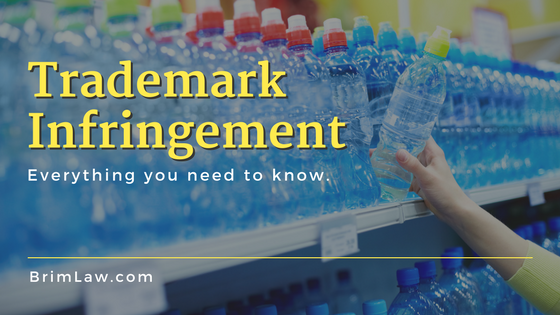EVERYTHING YOU NEED TO KNOW ABOUT TRADEMARK INFRINGEMENT

EVERYTHING YOU NEED TO KNOW ABOUT TRADEMARK INFRINGEMENT
Are you developing a brilliant product or service?
Have you created a fun logo or moniker that represents your product or service?
Think you’re ready to sell it on the open market?
Well, not so fast. Here’s the problem: Someone else may have a similar product or service already on the market. In addition, they may have trademarked it. I’m sure that your particular product or service is innovative and unique in its own way, and may even be the next-big-thing. However, let’s discuss everything you need to know about trademarks and trademark infringement before your brand paddles too far into the “deep sea market.”
1. What is a trademark?
A trademark is a “word, phrase, symbol, and/or design that identifies and distinguishes the source of the goods of one party from those of others” (United States Patent and Trademark Office). Some examples include a business’ name, slogan, and logo.
Most people are unfamiliar with the term “service mark,” which is closely related to “trademark.” Typically, business owners treat and refer to service marks as if they are trademarks, but a service mark is “a word, phrase, symbol, and/or design that identifies and distinguishes the source of a service rather than goods.”
2. What is trademark infringement?
Trademark Infringement is the unauthorized use of a trademark in association with a good or service in such a way that’s likely to cause confusion about the source of the good or service. In other words, a customer or client would be confused about which company is offering the product or service (also known as a “likelihood-of-confusion”). If your company sells crispy-lime taco shells in the grocery store, you don’t want customers to be misled into buying a competitor’s crispy-lime taco shells because the competitor uses a similar logo or slogan on their packaging.
3. What happens if you are sued for trademark infringement?
It isn’t pretty. Among other unpleasant sanctions, you can be hauled into court and held liable for hundreds of thousands of dollars. In addition, you could be required to destroy your products or marketing materials that use the prohibited word, phrase, or symbol. You could also be required to hand over any profits you gained from the sale of those goods and services associated with the trademark (not to mention paying for the trademark owner’s court costs and attorneys’ fees).
4. What does trademark infringement look like?
Like any other legal matter, not all trademark infringement cases look the same. Here are some real-life case studies involving trademark infringement allegations.
LOUIS VUITTON VS. LOUIS VUITON DAK (2016)
Facts: French high-end leather goods retailer, Louis Vuitton, filed suit against a South Korean fried chicken, fast-food company named “Louis Vuiton Dak.”
Ruling: The court held the South Korean restaurant liable (fined $1250) for trademark infringement because the name was too similar to Louis Vuitton’s name. Furthermore, the fried chicken was wrapped in packaging with the iconic LV symbol.
Perhaps, Louis Vuitton wasn’t a fan of fried chicken. Unfortunately, this story doesn’t end here. After the ruling, the restaurant changed its name to “Louisvui tondak.” This subtle rearrangement of letters was deemed to be too similar to the letter arrangement in “Louis Vuitton.” The restaurant was fined again ($14.5 million dollars) for non-compliance.
Facts: Athletic retailer, Adidas, sued women’s clothier, Forever 21, for using its “three stripe” design on a collection of Forever 21 sweatshirts. Adidas argued that it invested millions of dollars to protect its trademark over the years.
Ruling: Adidas voluntarily dismissed the case, which indicates the matter was likely settled outside of court.
5. Can a trademark owner sue someone for infringement in state or federal court?
Yes, a trademark owner may file in either court. However, most plaintiffs choose federal court. In many instances, trademark infringement cases are removed from state to federal court.
*Georgia statutes (and a line of cases) governing trademarks and trademark infringement closely follow federal trademark law.
6. What should I do if someone is using my trademark?
First, it’s imperative to sit down with an experienced attorney to help you (1) determine whether you actually have an infringement case, (2) analyze the facts and issues involved, and (3) determine the least expensive way to protect your rights.
Because of “common law” rights, you are not required to register your trademark in order to have exclusive rights to the use of your trademark. However, a trademark infringement case is far more successful if your trademark has been registered with the USPTO. Without registration, you lose several benefits and advantages like a legal presumption that you are the valid/real owner of the mark with exclusive rights to it.
Registering your mark sooner rather than later also gives the world notice that you are the owner of the mark. Working with an attorney early on to register your mark may also help you avoid infringing on someone else’s mark because a comprehensive trademark search is involved before actually registering a client’s mark.
Your Thoughts: Have you ever tried trademarking your logo or slogan? What do you wish someone would have told you before you started the process on your own?
This article is intended to provide you with general information; it does not constitute any type of legal advice. For recommendations related to your specific matter, we encourage you to review our Practice Areas page for additional information and then contact us to discuss your company’s legal needs.

